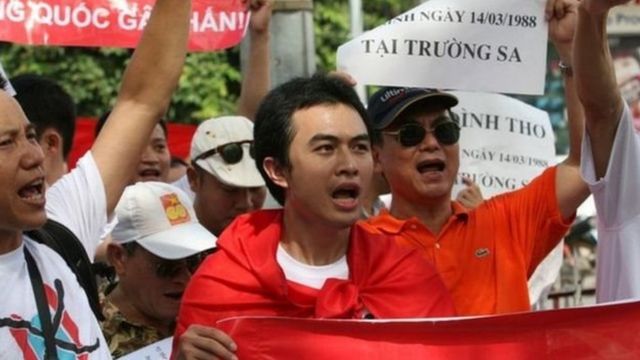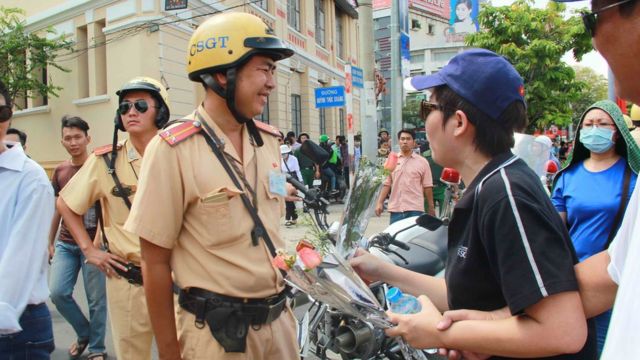Luật Khoa editor-in-chief Trinh Huu Long sits down with BBC News Tiếng Việt to share his thoughts on the delays by the Vietnamese government to come up with a law on protests.
- Title: VN: Giới đấu tranh nói hoãn luật biểu tình ‘đẩy dân vào thế rủi ro’
- Publish Date: May 15, 2020
- Publisher: BBC News Tiếng Việt
Excerpt:
Note: Original texts in Vietnamese.
The Vietnamese government continues to delay the Law on Protests due to “afraid of hostile forces to disrupt”. What dangers do people face and what should be done to protect their rights?
The Vietnamese government has just said that it has not yet proposed to include a number of bills, including the Law on Protests, into the law-making program for 2020 and 2021.
Analysts say that the real reason behind the decision to delay the Protest law for nearly 10 years was “to protect the regime”.
“In a less transparent environment like Vietnam, we hardly have an answer to the real reason for the delay. I can only surmise that this is purely a political issue, a safety issue. of the regime,” said Mr. Trinh Huu Long, jurist, editor-in-chief of Luat Khoa magazine, in an interview with BBC News Vietnamese on May 14.
Fear of arguments, fear of losing privileges
Activist Nguyen Ngoc Nhu Quynh from the US told BBC News Vietnamese on May 13: “The Law on Protests is like a ball being kicked back and forth from the Government to the National Assembly to the Ministry of Public Security and the last reason. The last but most authentic announcement by the Ministry of Public Security has just been announced by the Ministry of Public Security that is fear of hostile forces taking advantage of it. With past experiences, related to student movement protests in Saigon before 1975. , the Communist Party understands better than anyone the concept of ‘taking advantage of protests’ to oppose the government, this is the biggest reason to delay the Law on Protests.”
From Taiwan, jurist, journalist, and editor-in-chief of Law Faculty Trinh Huu Long said that one of the reasons for delaying the publication of the draft Law on Protests by the Ministry of Public Security was fear of being publicly commented and opposed. defend.

Trinh Huu Long (centre) at one of the 2011 summer protests
He analyzed: “According to the normal process, a bill that needs to be passed takes at least 2 sessions of the National Assembly, which means a year. First, they will submit to the National Assembly for comments at a session, Sooner or later, the law can be passed at the next session.In that year, the draft must be announced to the public, the National Assembly deputies must give opinions, the press will have to step in. not only the domestic press but also the international press. People will participate a lot, especially through social networks.”
“We can imagine that if the Ministry of Public Security and the Government submit the bill to the National Assembly, it will open up a huge discussion space. If we are the Government, we are the Communist Party of Vietnam, Do we want to open such a large playground that lasts a year for all participants?”, he added.
Activist Nguyen Trang Nhung analyzed: “When having substantive rights, people will exercise their rights, especially those who are interested in politics and society will speak out more, express their attitudes more than by protests. This puts pressure on government agencies, forcing the government to adjust existing policies and ways of working, which is what the government does not want.”

People give flowers to traffic police during the Formosa 5/2016 protest at Ben Thanh market area, Ho Chi Minh City
“Not only have the right to protest, the Vietnamese people have long been restricted in many other human and civil rights. Government agencies always want to maintain that so that they can easily govern and act arbitrarily. act as they please. If there are laws now and the right to protest is exercised substantively, the government will lose its privileges. They can’t behave arbitrarily anymore.”
“If the promotion of these rights goes further, leading to multi-party, for example, then the Communist Party of Vietnam will no longer have a unique position,” added Ms. Trang Nhung.
Lawyer Trinh Huu Long said that the Ministry of Public Security and the Government do not want to lose their privilege, which is to “use law enforcement documents to control protests”.
In another aspect, Mr. Long also commented that the delay of the protest law is also related to the political life of the Minister of Public Security himself: “This is a pivotal period in preparing senior personnel before the Congress. Party. As one of the candidates for the top leadership positions, Minister To Lam will not risk introducing a bill that will cause a stir, which could affect his political chances.
What do people have to do?
Citing the fact that Vietnam does not have an independent court, an impartial and objective trial, it is difficult for the people to have tools to protect as well as the abuse of power by the executive side is difficult to control, lawyer Trinh Huu Long said: Because of the absence of such legal protection mechanisms, people who want to protect their rights have to resort to external mechanisms, such as international organizations and foreign governments. equally regrettable”.
“When the number of people who exercise and support the right to protest is large enough, then the behavior of the government will have to change, and change in a positive direction. The story lies in the correlation of power between the two. The people and the government We are talking about the law with an autocratic government, with people who completely disobey even the law, even the constitution they put in. This is not a legal story. law. It is a political story,” he analyzed.
“People, if they want their rights to be respected, have no choice but to persevere and courageously exercise their rights when necessary, not wait for the Ministry of Public Security, not the Government, no waiting for the National Assembly to grant me the right to protest.”
According to Mr. Long, people need to realize that “the right is in themselves, not in any law”. “Once we have enough people to exercise that right, we will change the situation,” he stressed.
Download article in Vietnamese:
Download article in English: